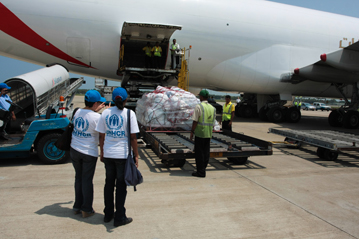Feature: Building a future with their own hands
Feature: Building a future with their own hands

LISOVIC, Serbia and Montenegro (UNHCR) - A decade in exile may seem like a setback for the most people, but the Tarbuk family has found reasons to celebrate - a wedding anniversary, a new home and the start of a new life in their adopted country, Serbia and Montenegro.
The family recently invited their relatives, friends and neighbours to mark the 52nd wedding anniversary of Dragan and Draginja in their nearly-completed house in the hilly village of Lisovic, some 30 km from the Serbian capital, Belgrade. The festive atmosphere was a far cry from the trauma they experienced when they fled Croatia in August 1995 - almost 10 years ago - leaving behind almost everything they had, including years of memories.
"The hard days are behind us and I don't even want to recall them," says Draginja, a lively 72-year-old woman. "I never dreamt of leaving and starting again, but that is life. We are happy now that we have our own home and are healthy and able to work so that we are not dependent on humanitarian aid."
Showing off the ground floor of the red brick house, Draginja points proudly to the curtains and tablecloth she weaved and embroidered herself. She adds, "What we received from UNHCR and the Red Cross in the first few years helped us to survive. But to tell you the truth, if you are not able to help yourself, that assistance alone is not enough. One has to demonstrate readiness and vigour, and take destiny in your own hands."
That is what the three generations of Tarbuks did. In all their years of exile, they have never spent a day in a collective centre or camp, finding modest accommodation instead. In the beginning, it was not easy for Dragan and Draginja in their late 60s to work on other people's land and take care of their granddaughter Dragana while her parents, Zoran and Zlata, went to work.
After many temporary jobs, Zoran found permanent work at a shoe factory in one of Belgrade's suburbs. His wife Zlata worked as a cleaner and baby-sitter until she found a job in the kitchen of a local clinic. Dragana and her brother Neven started attending school. Life gradually returned to normal.
"Of course we thought of going back to Croatia," says Zlata, remembering their first years in Serbia. "But that was not an option for us back then. Our houses were occupied by other families - Croat refugees from Bosnia and Herzegovina - and they are still there."
The Tarbuks filed an application with the Croatian authorities for the repossession of property, but at the same time, decided to go for the second best option - local integration in their host country. They applied for citizenship in Serbia and Montenegro.
Like many of the hundreds of thousands of refugees there in the late '90s, the Tarbuks were helped by their relatives and friends. One of their relatives helped them buy the land in Lisovici. At first, they cleaned and adapted the dilapidated barn so that they could move in and live there temporarily while trying to build a proper house. But no matter how hard they worked and saved, they were unable to go beyond the foundations for the small house.
Thankfully, in 2002, they received a donation of construction materials valued at $2,100, consisting of doors, windows, bricks and cement. This helped them to finalise their new home on the hill. The donation was part of an integration project to help refugee families who had decided to integrate fully in their host country and who had already started construction or bought something in an attempt to solve their housing problem.
"For some people, the donation may not seem like much, but for us, it meant everything," says Draginja.
With a place of their own for the first time, the windows of opportunity have slowly started to open for the Tarbuk family. Dragan managed to retrieve his pension from Croatia, and the regular retirement cheques have become a welcome contribution to the family budget.
"There is still a lot of work to be done on the house. Come spring, I will be spending all my time after school and training to help my father and grandfather," says Neven, a 16-year-old junior at the local Belgrade volleyball club. He looks and talks like a regular Belgrade boy, has many friends and does his best to get good enough grades to get a computer.
While Neven is enjoying his new life in Serbia, he has not forgotten about his native home in Babina Rijeka, Croatia. Sometimes, he says, he can still hear the sound of the small creek running over the stones behind his old house.
Now citizens of the State Union of Serbia and Montenegro and proud owners of a small estate, the Tarbuks found their own way in life mostly thanks to their positive attitude and hard work.
"We would have managed to finalise the house anyhow," says Dragan. "We were adamant to push for it, but without the construction material we received from UNHCR and ECHO [European Commission for Humanitarian Aid Office], it would have been much more difficult. It really made a difference for us."
By Vesna Petkovic
UNHCR Serbia and Montenegro









